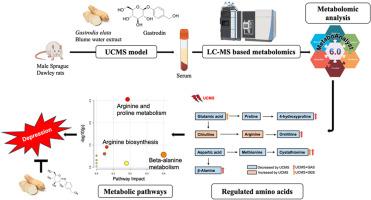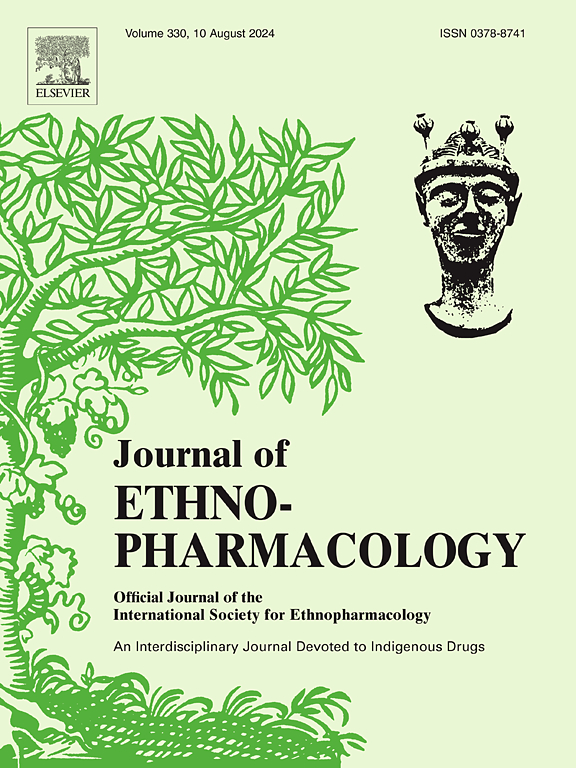不可预测的慢性轻度应激诱导的抑郁大鼠的氨基酸代谢谱分析以及天麻和天麻素的保护作用。
IF 4.8
2区 医学
Q1 CHEMISTRY, MEDICINAL
引用次数: 0
摘要
民族药理学意义:重度抑郁症(MDD)是一种影响全球约 3.5 亿人的常见疾病。一些研究发现,MDD 患者血液中的氨基酸发生了变化,这表明氨基酸有可能成为生物标志物,从而更好地了解它们在抑郁症中的作用。天麻(Gastrodia elata Blume,GEB)及其活性化合物天麻素(Gastrodin,GAS)具有公认的抗抑郁特性。然而,人们对它们对氨基酸谱的影响及其在缓解抑郁症方面的潜在作用仍然知之甚少。了解 GEB 和 GAS 如何影响氨基酸代谢可为了解它们缓解抑郁的机制提供新的视角,从而有可能制定出更有针对性的治疗策略:本研究旨在探讨补充 GEB 及其活性化合物 GAS 对逆转抑郁大鼠氨基酸谱改变的潜在作用:为此,研究人员采用 UCMS 大鼠模型诱导六周大的 SD 大鼠出现抑郁样行为,为期五周。在 UCMS 模型中,接受 GEB 或 GAS 的组每天通过灌胃口服给药。收集血清样本,并采用目标代谢组学方法(LC-MS)进行氨基酸谱分析:结果:共鉴定出 38 种氨基酸代谢物,其中 17 种在 UCMS 后发生了显著变化。UCMS 大鼠的精氨酸生物合成、精氨酸和脯氨酸代谢途径受到干扰。补充 GEB 和 GAS 后,这些代谢途径中关键氨基酸的变化得到逆转,抑郁症状也得到缓解:总之,UCMS 诱导的大鼠抑郁症会导致一些氨基酸代谢产物发生变化,这些变化与人类抑郁症中发现的氨基酸代谢产物相似,从而验证了其作为抑郁症研究模型的相关性。此外,研究还表明,GEB 和 GAS 可通过调节氨基酸代谢发挥抗抑郁作用。本文章由计算机程序翻译,如有差异,请以英文原文为准。

Amino acid metabolites profiling in unpredictable chronic mild stress-induced depressive rats and the protective effects of Gastrodia elata Blume and gastrodin
Ethnopharmacological relevance
Major depressive disorder (MDD) is a prevalent condition that affects approximately 350 million people worldwide. Several studies have identified changes in amino acids in the blood of MDD patients, suggesting their potential as biomarkers to better understand their role in depression. Gastrodia elata Blume (GEB) and its active compound gastrodin (GAS) are recognized for their antidepressant properties. However, their effects on amino acid profiles and their potential role in alleviating depression remain poorly understood. Understanding how GEB and GAS influence amino acid metabolism may offer novel insights into their mechanisms in alleviating depression, potentially leading to more targeted therapeutic strategies.
Aim of the study
This study aimed to investigate the potential role of supplementing GEB and its active compound GAS to reverse altered amino acid profiles in depressed rats.
Materials and methods
To achieve this, six-week-old SD rats were induced depressive-like behaviors by the UCMS rat model for 5 weeks. Groups receiving GEB or GAS were administered orally via gavage daily within the UCMS model. Serum samples were collected and analyzed using a targeted metabolomics approach employing LC-MS for amino acid profiling.
Results
A total of 38 amino acid metabolites were identified, 17 of which were significantly altered following UCMS. UCMS rats exhibited perturbed arginine biosynthesis, arginine and proline metabolism pathways. Changes in key amino acids in these metabolic pathways were reversed following supplementation with GEB and GAS, which also alleviated depressive symptoms.
Conclusions
In conclusion, UCMS-induced depression in rats causes changes in some amino acid metabolites similar to those found in human depression, validating its relevance as a model for studying depression. Additionally, the research suggests that GEB and GAS may exert antidepressant effects by regulating amino acid metabolism.
求助全文
通过发布文献求助,成功后即可免费获取论文全文。
去求助
来源期刊

Journal of ethnopharmacology
医学-全科医学与补充医学
CiteScore
10.30
自引率
5.60%
发文量
967
审稿时长
77 days
期刊介绍:
The Journal of Ethnopharmacology is dedicated to the exchange of information and understandings about people''s use of plants, fungi, animals, microorganisms and minerals and their biological and pharmacological effects based on the principles established through international conventions. Early people confronted with illness and disease, discovered a wealth of useful therapeutic agents in the plant and animal kingdoms. The empirical knowledge of these medicinal substances and their toxic potential was passed on by oral tradition and sometimes recorded in herbals and other texts on materia medica. Many valuable drugs of today (e.g., atropine, ephedrine, tubocurarine, digoxin, reserpine) came into use through the study of indigenous remedies. Chemists continue to use plant-derived drugs (e.g., morphine, taxol, physostigmine, quinidine, emetine) as prototypes in their attempts to develop more effective and less toxic medicinals.
 求助内容:
求助内容: 应助结果提醒方式:
应助结果提醒方式:


